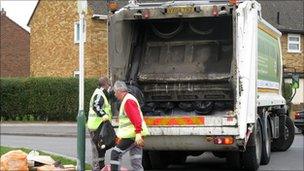Councils 'not obliged' to provide weekly bin collection
- Published
- comments

More than half of councils now collect domestic rubbish once a fortnight
The government has admitted it cannot force councils in England to provide weekly bin collections.
Communities Secretary Eric Pickles had hoped to include the measure in a new waste strategy but it was watered down following a row with officials at Defra, the BBC understands.
The strategy says collections should happen "more frequently" but it is up to councils to offer "local solutions".
Labour said the result was "another broken promise" by the government.
But Mr Pickles insisted the strategy would provide better value for money for householders.
Better service
He said: "Families pay £120 a month in council tax. Both Whitehall and the town hall need to raise their game to deliver more frequent and better rubbish and recycling collections in return."
Downing Street said the government understood that "people have a reasonable expectation that their bins are collected on a weekly basis" but although ministers "had a view" about the frequency of collections "ultimately councils are accountable to their local electorate".
The BBC understands that once councils told ministers the £100m a year cost of reintroducing weekly bin collections would have to be met by central government, the idea was effectively shelved.
More than half of councils now collect domestic rubbish once a fortnight. Some authorities say weekly collections work best, while others argue that the "alternate weekly collection" of different types of waste is the most effective way to increase recycling.
'Curry claim'
In 2008, Mr Pickles told the Tory party conference that weekly collections would "be back" if the party gained power and a "decent" refuse service was "vital" to help "protect the local environment and public health". As recently as January, he said the issue needed to be sorted out.
Amid a barrage of criticism from Labour MPs in the Commons, Environment Secretary Caroline Spelman denied there had been a U-turn, saying the government was "fulfilling the provisions regarding waste" set out in the coalition agreement.
She also said £100m in additional funding would be made available to councils to remove the most noxious food waste once a week.
But Shadow Environment Minister Jamie Reed said the Conservatives had promised the public that weekly bin collections would be reinstated.
Fortnightly bin collections help recycling rates claims LGA's Richard Kemp
"Before the election, the Secretary of State (Mr Pickles) said - to much acclaim among his own party - that it was a basic right for every Englishman and woman to be able to put the remnants of their tikka chicken masala without having to wait two weeks for it to be collected," he said.
"Perhaps he can explain why it is the government's position has changed."
Friends of the Earth said weekly collections resulted in less recycling and the government should focus instead on halving black bag waste over the next ten years.
Fly tipping
As part of the new strategy, councils' rights to fine people up to £1,000 for minor domestic waste offences are to be scrapped. But there will be sanctions for the most serious rule-breakers, such as fly-tippers.
Householders currently can be punished for such actions as leaving dustbin lids open and using the wrong bin.
The government is to remove most of those powers from English councils but town halls will be able to issue fixed-penalty notices of between £75 and £100 to people who allow rubbish to pile up, or those who fly-tip.
Ms Spelman said the government's emphasis must be on ideas to enable households and businesses to be smarter with their waste.
There will be a ban on wood going to landfill from homes or industry - with it being burned for energy instead - while ministers intend to work with the hospitality industry to try to reduce food waste and with the toy industry to cut excessive packaging.
The Local Government Association, which speaks on behalf of more than 400 councils in England and Wales, welcomed the latter move, saying efforts were needed to reduce such waste "at source".
"Allowing councils to identify and work with people who misunderstand or make mistakes when sorting their rubbish is important," it added. "As a last resort councils also need effective, proportionate powers to take action against households or businesses which persistently or wilfully damage the local environment."
- Published11 June 2011
- Published17 February 2011
- Published4 January 2011